|
Here are all the paintings of MEMLING, Hans 01
| ID |
Painting |
Oil Pantings, Sorted from A to Z |
Painting Description |
| 52197 |
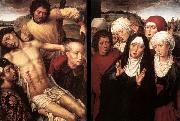 |
Diptych with the Deposition |
1492-94 Oil on oak |
| 68409 |
 |
Evangelist Johannes |
Date Deutsch: um 1468
English: c. 1468
Technique Oil on panel
Dimensions Deutsch: 71 ?? 30 cm
|
| 8179 |
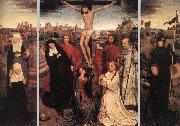 |
Portrait of an Old Woman sh |
1468-70
Oil on wood, 25.6 x 17.7 cm
Museum of Fine Arts, Houston, Texas |
| 8185 |
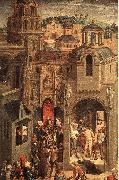 |
Scenes from the Passion of Christ (detail) sg |
1470-71
Oil on oak panel
Galleria Sabauda, Turin |
| 8184 |
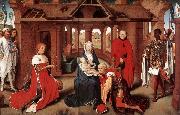 |
Scenes from the Passion of Christ (detail) sh |
1470-71
Oil on oak panel
Galleria Sabauda, Turin |
| 8183 |
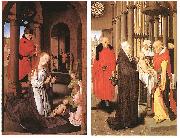 |
Scenes from the Passion of Christ (left side) sg |
1470-71
Oil on oak panel
Galleria Sabauda, Turin |
| 8176 |
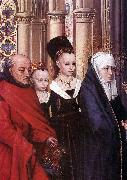 |
The Presentation in the Temple (detail sg |
1463
Oil on wood
National Gallery of Art, Washington |
| 8175 |
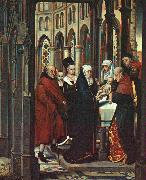 |
The Presentation in the Temple ag |
1463
Oil on wood, 60 x 48 cm
National Gallery of Art, Washington |
| 8180 |
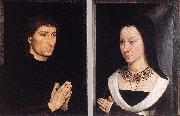 |
Tommaso Portinari and his Wife wh |
c. 1470
Oil on wood, 44.1 x 33,7 and 44,1 x 34 cm, respectively
Metropolitan Museum of Art, New York |
| 8178 |
 |
Triptych of Jan Crabbe ey |
1467-70
Oil on oak panel, 78 x 63 cm (central panel), 83,3 x 26,7 cm (each wing)
Museo Civico, Vicenza |
| 8181 |
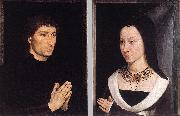 |
Triptych sg |
c. 1470
Oil on wood, 96,4 x 147 cm (central), 98 x 63,5 cm (each wing)
Museo del Prado, Madrid |
| 8177 |
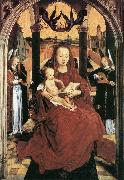 |
Virgin and Child in a Landscape sg |
Oil on wood, 50 x 29 cm
Collection Rotschild, Paris |
| 8182 |
 |
Wings of a Triptych sh |
c. 1470
Oil on wood, 98 x 63,5 cm (each wing)
Museo del Prado, Madrid |
|
|
| MEMLING, Hans
|
| Netherlandish Northern Renaissance Painter, ca.1435-1494
South Netherlandish painter of German origin. Together with Dieric Bouts I and Hugo van der Goes, he was one of the most important exponents of the new artistic developments that flourished in the southern Netherlands in the 15th century in the wake of Jan van Eyck, the Master of Fl?malle and Rogier van der Weyden. Their principal innovation was to apply optic realism to devotional or mystical subjects. Although Memling lived in the turbulent period of transition from the Burgundian ruling house to that of the Habsburgs, little of this is evident in his work. His commissions were almost exclusively from rich burghers in Bruges (bankers, merchants and politicians) or churchmen and the occasional aristocrat. Often they were foreigners, especially Italians, who had political or financial connections with the town, whose central economic position was to last only a few decades longer. They had Memling paint their portraits, bust or full length, in devotional paintings or on altarpieces for their chapel in Bruges or back home. He seems not to have received official commissions (from the town council or court). An exceptional proportion of this oeuvre has survived. Besides about 20 altarpieces, often in several panels and of considerable size,
|
|


